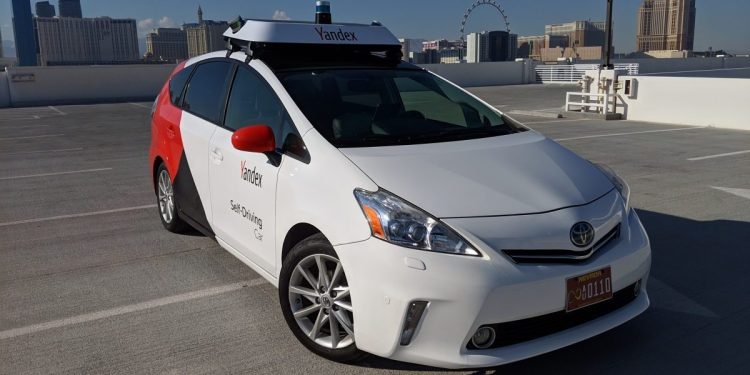Watch all the Transform 2020 sessions on-demand here.
Russian tech giant Yandex has been testing autonomous vehicles on public roads since December 2017, starting in Moscow and then expanding to Innopolis and Skolkovo, Russia, as well as Las Vegas. The program’s next phase saw cars reach Tel Aviv’s city limits, and roughly a year after launching what it claimed was Europe’s first robot-taxi service, Yandex today announced its cars have traveled 1 million miles combined on public roads. That’s up from 100,000 miles in April 2019 and 500,000 miles in August 2019.
Yandex credited an uptick in the number of miles its cars travel per week with the early milestone, which the company says is equivalent to driving every New York City street 166 times, or the distance the average driver will complete in 70 years. The cars now drive over 80,000 every week autonomously, nearly twice the weekly miles in 2018.
“The most challenging part of self-driving technology is predicting human behavior,” said head of Yandex’s self-driving division Dmitry Polishchuk in a previous statement. “It’s easier to drive when traffic is light and almost everyone nearby is following the traffic rules. As soon as the traffic gets heavier, drivers change their behavior, violating rules more often and the entire situation on the road becomes less and less predictable. We are learning to better deal with these dynamics now to prepare for these kinds of challenges wherever they happen next.”
It’s worth noting that Yandex lags behind Waymo, the de facto leader in the autonomous driving segment with over 10 million autonomous miles logged to date and 10 billion driven in simulation. GM’s Cruise is widely believed to be in second place by mileage, with around 450,000 autonomous miles driven in California last year alone, according to a report filed with the state’s Department of Motor Vehicles.
June 5th: The AI Audit in NYC
Join us next week in NYC to engage with top executive leaders, delving into strategies for auditing AI models to ensure fairness, optimal performance, and ethical compliance across diverse organizations. Secure your attendance for this exclusive invite-only event.
But today’s announcement underlines the accelerating pace of Yandex’s self-driving efforts. Mere months after the company announced it would open a local Tel Aviv office and expand its global driverless fleet to 100 cars, it revealed that the Israeli Ministry of Transportation granted it permission to operate in busy areas beyond the city’s northern neighborhoods. Coinciding with the expanded footprint, Yandex said it would grow its Tel Aviv car fleet to 10 vehicles.
Work on Yandex’s platform began in earnest in 2016, when the company’s 120-person self-driving team started piecing together components atop a Toyota Prius V chassis. What emerged is largely custom, from the sizable under-the-trunk PC to the roof-mounted sensor stack consisting of three Velodyne lidars, five cameras, eight radars, and GPS.
Currently, a small team within Yandex handcrafts maps of areas ahead of deployments, but the company expects the process will become more or less automatic in the future. To date, Yandex says its autonomous taxis have given “thousands” of rides both with and without in-car safety drivers who keep tabs on route progress (along with teleoperators). And within four years, the company intends to build a car without a steering wheel that’s capable of “human-level” driving in certain cities.
There’s a decent chance that car will be built in partnership with Hyundai Mobis. Yandex earlier this year signed a memorandum of understanding with Hyundai to develop control systems for autonomous vehicles, and to spearhead a driverless prototype vehicle based on standard Hyundai or Kia production model cars. The companies said at the time that they plan to build a new autonomous control system as an out-of-the-box solution intended for car manufacturers, car sharing services, and taxi fleets.
Yandex has competition in Daimler, which last summer obtained a permit from the Chinese government allowing it to test autonomous cars powered by Baidu’s Apollo platform on public roads in China, and Beijing-based Pony.ai, which has raised $264 million in venture capital and in early April launched a driverless taxi pilot in Guangzhou. Meanwhile, Alphabet’s Waymo, which launched a commercial driverless taxi service in December 2018, says it’s now servicing over 1,000 riders with a fleet of more than 600 cars.
Startup Optimus Ride built out a small autonomous shuttle fleet in New York City, following news of Apple acquisition target Drive.ai’s expansion into Arlington, Texas. Cruise has been testing an autonomous taxi service for employees in San Francisco and plans to launch a public service this year. Other competitors include Tesla, Zoox, Aptiv, May Mobility, Pronto.ai, Aurora, and Nuro, to name a few.
According to marketing firm ABI, as many as 8 million driverless cars will be added to the road in 2025, and Research and Markets anticipates that there will be some 20 million autonomous cars in operation in the U.S. by 2030.


